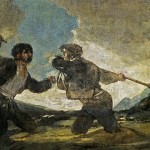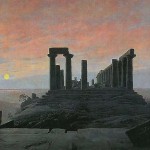Sophiology (though not known by that name until the twentieth century) arose in the seventeenth century as a response to natura pura theology and the rise of scientific materialism. The natura pura theologians—Suarez and Cajetan among them—were Schoolmen and they provoked a strong reaction from some mystically inclined English scientists and religious thinkers, especially from Robert Fludd (1574–1637) and Thomas Vaughan (1621–1666).
The Day Laudato Si was issued, I spent my time alternating between reading snatches of the encyclical and editing some of Thomas Vaughan’s writing for an upcoming collection (tentatively entitled The Book of Splendor: A Sophiology Casebook). Vaughan—an Anglican priest, alchemist, and twin brother of the poet Henry Vaughan—despised natura pura and accused the Schoolmen who espoused it of apostasy and atheism. A passage from Vaughan’s Euphrates (1655) struck me as though it could have been lifted from Laudato Si:
I suppose it will not be denied that God is more metaphysical than any scripture can be, and yet in the work of salvation it were great impiety to separate God and Nature, for then God would have nothing to save, nor indeed to work upon. How much more absurd is it in the ministry of Nature to separate Scripture and Nature, for to whom—I beseech you—doth Scripture speak? Nay, to whom is salvation ministered if Nature be taken away? I doubt not but man stands in Nature, not above it; and let the Schoolmen resolve him into what parts they please, all those parts will be found natural, since God alone is truly metaphysical.
As far as Laudato Si is concerned, I stand with Vaughan: let the Schoolmen resolve it into what parts they please.












